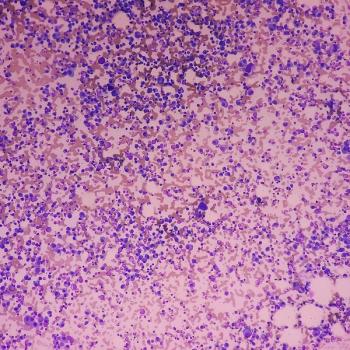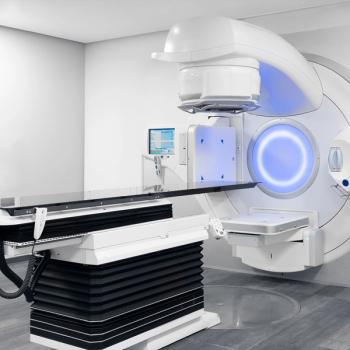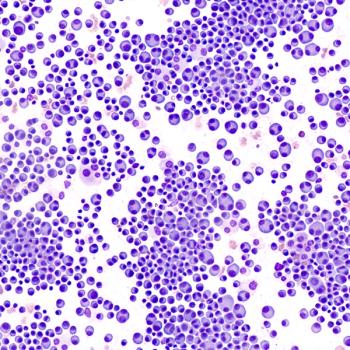
Patients with intermediate- or high-risk MDS experienced a higher modified overall response rate with the venetoclax/azacitidine vs placebo/azacitidine.

Patients with intermediate- or high-risk MDS experienced a higher modified overall response rate with the venetoclax/azacitidine vs placebo/azacitidine.

Lisa Hwa Christenson, DNP, CNP, FAPO, shares best practices for monitoring CRS and ICANS with BCMA bispecific antibodies in community oncology.

Biology-guided radiotherapy involves teamwork across multiple specialists, according to Samantha Bianzon, BSN, RN.

Understanding which patients may benefit from CLDN6-targeting immunotherapy and recognizing potential adverse effects is essential for oncology nurses.

Karolina Faysman, NP, explains how step-up dosing is used to reduce CRS and ICANS with bispecific antibodies in multiple myeloma.

Nurses must stay up to date on novel agents and their toxicities to properly monitor for and manage immune effector cell-associated neurotoxicity syndrome.

The role of nurses and APPs is crucial to ensuring patients with cancer can receive newer therapies, shares David A. Braun, MD, PhD.

Survey results show patients may overestimate dermatologic AEs from anti-cancer therapies, raising concerns for treatment adherence.

Nurse practitioner Beth Faiman shares strategies to reduce infection risk in patients receiving bispecific antibodies for multiple myeloma.

Ronald Bleday, MD, discusses how nurses support a step-wise model to minimize opioid use after colorectal surgery while ensuring safe pain control.

Catering supportive care to the individual being treated helps better meet the needs of each patient, says Michelle Kirschner, MSN, RN, ACNP, APRN-BC.

Lisa Hwa Christenson, APRN, DNP, CNP, FAPO, outlines best practices for safely transitioning patients with multiple myeloma on bispecific antibodies to community care.

Experts share advice on tailoring frontline treatment and managing toxicities for individuals with hormone receptor–positive metastatic breast cancer.

Kelsey Martin, APRN, AG-ACNP-BC, AOCNP, discusses current ADCs in breast, bladder, and lung cancer and highlights promising agents in development.

Nurse practitioners give their advice on making treatment choices based on the patient’s medical history and preferences.

The investigational ADC rinatabart sesutecan was given breakthrough therapy designation for use in patients with recurrent/progressive endometrial cancer.

Oncology nurses are needed in research roles, which can provide experience with new therapies, explained Josh Settlemire, MSN, RN, OCN.

CRS is a common but manageable toxicity of CAR T-cell therapy and bispecific antibodies. Learn strategies to identify and manage this adverse effect.

Paolo Tarantino, MD, PhD, discusses ADC structure, toxicity, and nursing consideration for the treatment of patients with breast cancer.

Melissa Rikal, MSN, FNP-BC, AOCNP, shares strategies to help nurses improve adherence and patient education for oral oncolytic therapies.

IMvigor011 showed significant improvement in survival outcomes with adjuvant atezolizumab in ctDNA-positive MIBC.

Nurse practitioner Beth Faiman outlines nursing strategies to monitor, assess, and manage toxicities associated with talquetamab in multiple myeloma.

A significant reduction of opioid use in patients after colorectal surgery was supported by clinician and patient compliance, says Ronald Bleday, MD.

Beyond administering CAR T-cell therapy and bispecifics, oncology nurses must apply proactive, supportive care and an understanding of complex treatments.

A nurse-led clinic to aid in patient-reported symptom burden had high patient satisfaction.

Neurotoxicities can be monitored long term with personalized questions, according to Mary Steinbach, DNP, APRN.

Melissa Rikal, MSN, FNP-BC, AOCNP, explained that adverse effects are common among the available antibody-drug conjugates in breast cancer.

David A. Braun, MD, PhD, explained that personalized cancer vaccines can be associated with toxicities typical of both vaccines and immunotherapies.

In a phase 1 study, ELI-002 2P improved relapse-free survival in pancreatic and colorectal cancer, with stronger benefit in patients with T-cell responses.

Oncology nurses play a key role in monitoring, managing, and personalizing CDK4/6 inhibitor treatment to minimize toxicities and protect quality of life, according to Courtney Moore, APRN, FNP-C, OCN.